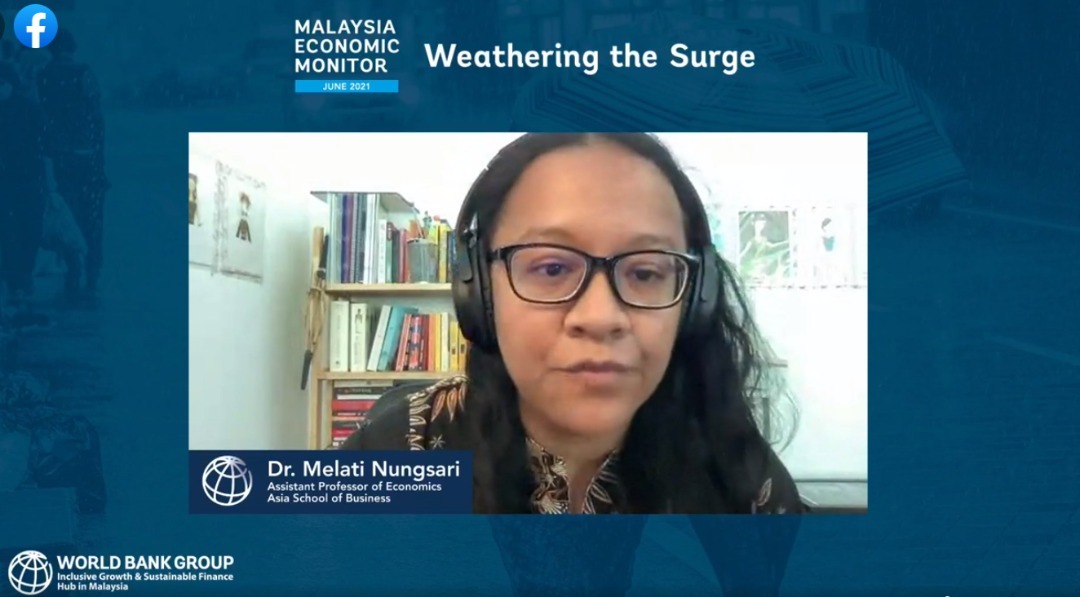KUALA LUMPUR, June 25 — The government should increase cash handouts to a wide range of households, including middle income earners, an economic expert said Wednesday.
Melati Nungsari, assistant professor of economics at the Asia School of Business (ASB), emphasised that the 10 per cent households in the middle class are sliding down the country’s income distribution, citing recent data from the Department of Statistics Malaysia.
e“This is sort of something that’s hitting all of us disproportionately on lower income people, but something that we need to address right now and to do this, I strongly believe that we really need increased cash handouts to households,” Melati said in a panel discussion session during the launch of the World Bank’s Malaysia Economic Monitor “Weathering the Surge” report.
Melati, who acknowledged the role of economic stimulus packages in the country, stated that financial aid should be given to a much larger group of community, beyond the bottom 40 per cent (B40) category and not just a one-off payment.
“It needs to be generous. Critics may say this will be expensive, and it will be. But I believe that it is actually more expensive not to do this in the long run. The socioeconomic impacts of this pandemic will be felt for months, years, way after the pandemic,” Melati added.
Vaccine Minister Khairy Jamaluddin said yesterday that Prime Minister Muhyiddin Yassin would release another economic assistance package soon.
A survey conducted by Melati in April 2020 predicted that households would run out of cash in three months.
“That has been more than a year ago. So we see that this is going to be disproportionately affecting lower income groups.”
Melati referred to a study conducted in the United States and mentioned that the direct effect of increased cash handouts to households in the country led to a reduction of food insufficiency by 40 per cent, financial instability by 45 per cent, while reported adverse mental health symptoms fell by 20 per cent.
“I think we also need to acknowledge that people’s needs are diverse. People need to pay phone bills for kids, education, people need to pay rent. So cash handouts really allow individuals to channel things where they need the most.”
At the same time, Melati highlighted the importance of sustaining as many businesses in Malaysia as possible to ensure household members are employed, pointing out that recovery from the epidemic will likely be private sector driven.
Melati specifically mentioned the wage subsidy programme, where she emphasised that the program should be expanded for a much longer period of time.
The wage subsidy programme is an initiative under the Social Security Organisation (Socso) which is expected to benefit a total of 250,000 employers and 2.6 million employees from all sectors.
Under this programme, eligible employers receive a wage subsidy of RM600 for each employee earning less than RM4,000 monthly.
“I do believe that given the economic and political uncertainty, many businesses are actually quite wary of taking out more loans. So the impact of increased credit may not actually reach businesses, more than say, paying them in order to be able to keep people on payroll.”
Melati also stated that school closures are not only impacting the future of the workforce, but also a major hurdle for parents to get access to proper child care.
“One main use of schools is really to ensure that parents get childcare, to have a place where parents can leave their kids in a safe area, with trusted people without child care and schooling.
“If we’re looking at September, with schools reopening, that’s months from now, mothers may have to drop out of the labour force, further diminishing household income, single parent families will face more difficulties with working, kids will be physically and mentally harmed, by staying at home.”
So Melati emphasised that the whole ecosystem surrounding child care is intact and Malaysia must slowly start rebuilding teachers, small day care centres, transportation and transit companies, as well as canteen providers.
“If you think about it, a seven-year-old now in 10 years will be 17 and entering the workforce. So putting our children first I think is a very smart investment.”
Melati pointed out that data from other countries indicates that children from lower-income groups are disproportionately disadvantaged from school closures, raising the possibility of widening income gaps in the next generation.
Finally, Melati also explained about the impact of the Covid-19 epidemic on the future of elderly people in the country.
The assistant economics professor, who pointed out the withdrawal of retirement funds under the economic stimulus packages in Malaysia, said: “Now, what this means is that, you know, in the next three, five or 10 years, as people start retiring, I think a lot of pensioners will be finding themselves with not very much money available to support them in their elderly years.”
She suggested that government policies should anticipate the long-term effects and work on measures to reimburse savings, or provide specific part-time job training opportunities or implement other initiatives primarily to protect pensioners as they enter their senior years.








